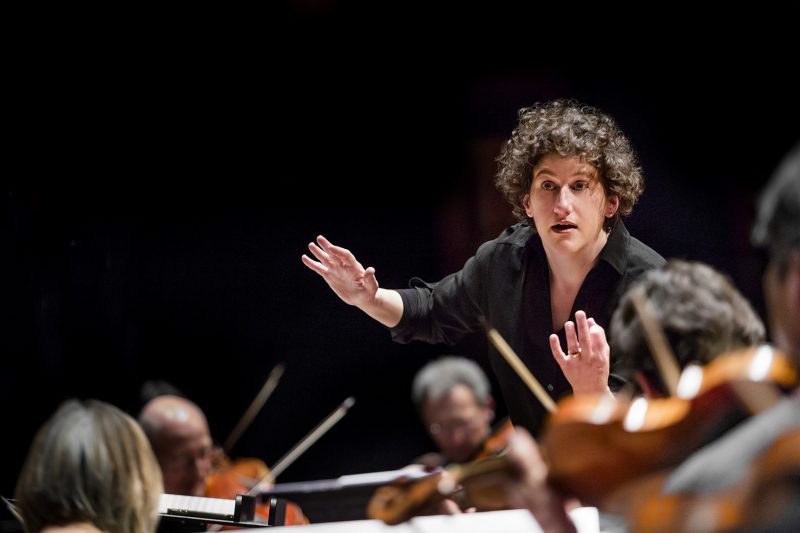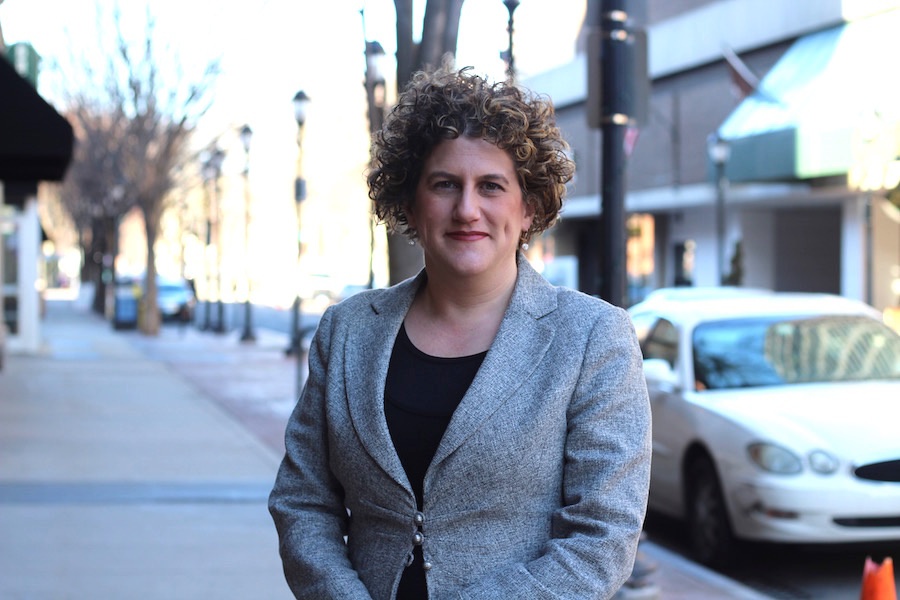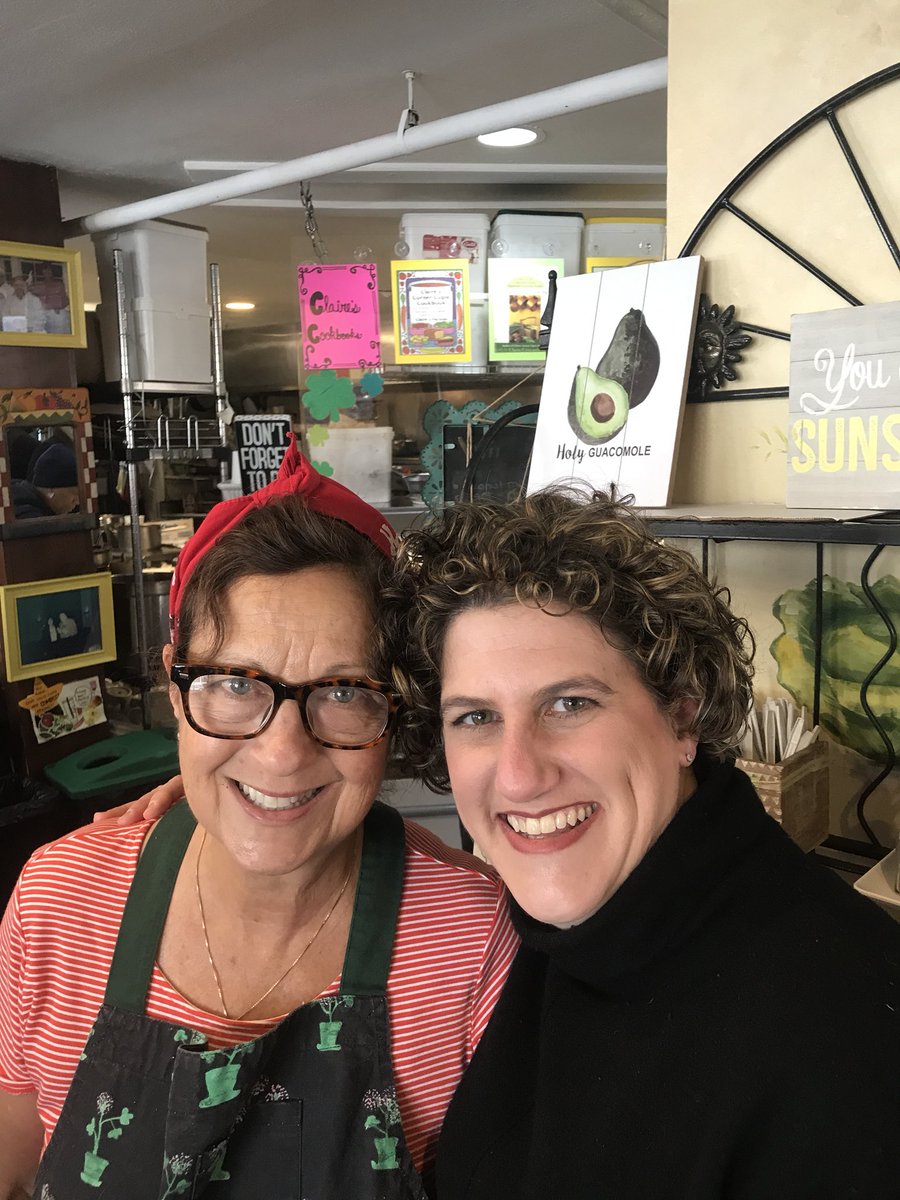
Music | Rebecca Miller | Arts & Culture | New Haven | New Haven Symphony Orchestra
 Rebecca Miller: "If I were going to book something for today , my program would look much different." Lucy Gellman Photo.
Rebecca Miller: "If I were going to book something for today , my program would look much different." Lucy Gellman Photo.
When Rebecca Miller takes the podium with the New Haven Symphony Orchestra (NHSO) this Thursday night, she’ll be looking back to role models audience members may not have heard of.
Amy Beach. Grace Williams. Dorothy Howell. Marin Alsop. Nicole Paiement. A string of women composers and conductors that have built the ground on which she walks.
The Principal Conductor of the Bishop’s Stortford Sinfonia, Associate Conductor of the Southbank Sinfonia, and Director of Orchestras at the Royal Holloway University of London, Miller is the second, and only female, candidate for music director of the NHSO, which bids farewell to current Music Director William Boughton in May 2019.
 NHSO Photo.
NHSO Photo.
This Thursday night, she guest conducts a program of Pyotr Ilyich Tchaikovsky, Dmitri Shostakovich and Alexander Borodin at Woolsey Hall. Cellist Nick Canellakis will return for the second time this season to play Shostakovich’s Concerto for Cello No. 1. More tickets an information are available at the NHSO’s website.
She comes in between finalists Alasdair Neale and David Amado, the latter of whom will guest conduct a concert on April 12 (Neale’s audition concert was in February). The three were selected from an international search that yielded over 150 candidates last year.
But it’s a program that doesn’t tell the whole story of who Miller is as a conductor. In an interview Monday, she said the lineup is a little bit of a fluke—because it doesn’t include any women, any composers of color, or any contemporary voices. When she applied for the position last year, she submitted eight potential programs to the symphony, to reflect the eight concerts that the music director oversees at the NHSO each year. In each, she sought to bring her approach to classical music—that it needs to be multicultural.
There were women composers and Black and Latino composers listed, including Duke Ellington, Grace Williams, Dorothy Howell, Arturo Marquez, Alberto GInastera, Blas Galindo, Astor Piazzolla. The proposed lineup with Tchaikovsky and Borodin originally included Dreamsongs, a 2013 piece by Yale School of Music professor Aaron Jay Kernis that Miller describes as “a beautiful, atmospheric cello concerto, which I thought provided a contrast to the Russian [composers].” But the symphony wanted Shostakovich, for Canellakis’ appearance.
“Here’s this program of dead white men,” she said, holding a steaming cup of spearmint lavender tea at Olives & Oil on Temple Street. “They [the NHSO] had booked Nick [Canellakis] to play the Shostakovich. So it became this all-Russian program, which is great. It’s wonderful music. If I were going to book something for today, my program would look much different. But this was programmed two years ago.”
Miller started working toward her approach as a young pianist, the only person in her friend group to pursue an instrument through high school. Born and raised by a college professor and engineer in Santa Cruz, Cali.—“a little bubble of multiculturalism”—Miller took an interest to the piano and violin from a young age, ultimately attending the Tanglewood Music Center’s summer program in Lenox, Mass. when she was in high school.
Placed in a trio with cello and violin, she spent the summer learning to “take a slight distance or perspective while you’re playing, and see how things are supposed to fit together.”
The camp was a revelation, she told her mom when she called home, feeding quarters into the phone as she sat on the floor of the dormitory. Playing piano solo was one thing, but being in a trio was entirely another—she was learning when to listen, and when to lead. She recalled being excited to sit down and play each day, because it unlocked something new in her brain, a syntax firing differently than it had before.
Her mom listened intently, and then asked a question Miller wasn’t expecting. Her daughter, this exuberant young musician, had taken piano, violin, singing, music theory and music history by the time she was in high school. Had she ever considered conducting?
“And I hadn’t,” said Miller. “And it kind of got the wheels turning.”
When Miller returned to Santa Cruz, she started taking conducting lessons with Nicole Paiement, a new faculty member at University of California, Santa Cruz and one of the first women on the conducting scene that Miller had come into contact with. Miller recalled that she “kind of took the university by storm.”
In that moment, Miller said she didn’t think about the fact that she was training under a woman who was one of the first in her field. But years later, she said it’s made an indelible impact on how she does her work, and who or what chooses to play at her concerts and in her teaching.
“I never thought about it at the time,” she said. “It was like: ‘Hey! Take some lessons with Nicole, because she’s such a fantastic conductor.’ But I’m sure that that made the possibility seem real to me. Because she was a woman. A woman role model … and I really looked up to her.”
Miller didn’t formally conduct until years later, when she got to the Oberlin Conservatory of Music. Only days into her arrival, she started choral and orchestral conducting as part of the curriculum. When she wasn’t in front of a group, she was studying at Oberlin’s College of Arts and Sciences, using classes in psychology, literature, religious studies and art history to broaden her understanding of music.
“I fell in love with the whole thing,” she said. “It just felt right. There were lots of nerds around just like me, and I’d never been in that kind of environment.”
But what didn’t specifically feel right as she progressed in the field—first at Oberlin, and then as a graduate student at Northwestern University—was the dearth of women behind the podium and in the programming she was hearing.
When Miller moved to England in 1999, conductor Marin Alsop had just begun positions with the Royal Scottish National Orchestra and with the City of London Sinfonia. As she rose in prominence, Miller found that she too got a lot of interview requests centered around her gender. So she started thinking about how it affected her work—the jobs to which she applied, the jobs to which she was accepted, and the jobs she ended up not going for. She began answering as candidly as she could.
“Nobody wants to get an opportunity because of their gender or not get an opportunity because of their gender,” she said. “There are definitely opportunities that I have not gotten because of my gender, but I am completely happy with the fact that there are opportunities that I have achieved because of my gender. There are places that have hired me because I’m a woman. I’m fine with that, because those particular opportunities were all for the right reasons. And I feel I have as much quality to offer as anybody else.”
As she continued with her work, often traveling internationally to conduct, she watched the conversation on women in orchestras “go quiet”—for a while. She continued it in her own circles, bringing new names to her teaching and her concerts around Britain, the U.S., Israel and Mexico. As her husband, the pianist Danny Driver, added more women to his repertoire, she followed suit, agreeing that the talent pool was deep enough to start making a practice of it.
And then in 2013, Miller watched as Alsop conducted the last night of the BBC Proms, and a chorus of detractors came out of the woodwork.
“There were all these statements made by conductors that women shouldn’t be on the podium,” she said. “Pretty terrible things that people said.”
It was another defining moment for Miller, and for several of the women around her. At The Southbank Centre, Miller started attending a new “Women in Music” breakfast that drew from all sectors of the music industry in the U.K. She watched as colleagues sprang into action, taking new steps to diversify their programming. And she renewed her commitment to showcasing women and people of color, who had been “totally overlooked” as composers finalized their syllabi and concerts.
“I used to be completely repulsed by the idea of programming something because it was a woman, or because of the racial background of a composer,” she said. “But now I think—I really do believe in positive action, as long as it’s done in a thoughtful and intelligent way and a careful way. Because it’s not happening by itself. It just isn’t.”
As she assembles 2018-2019 programming for the orchestra at the Royal Holloway University of London, she’s working with a quota that she’s set for herself—a minimum of 25 percent women composers, as a balance to “the big symphonic repertoire” that her students are chomping at the bit to play.
“It’s been easy to do,” she said. “There’s so much really great music out there that has been buried—often by the composer herself. So-and-so who thought her music was worthless and she was going to burn the whole catalogue … women who just put themselves down.”
She’s quick to say that she realizes it’s a balancing act. On Monday, NHSO Director Elaine Carroll told Miller that some of the symphony’s most devoted patrons had been subscribers for over 60 years. And they don’t specifically want new music.
“You have the people who want to hear the Beethovens and the Brahms and the Tchaikovskys and they won’t come out for the other things,” Miller said. “And you don’t want to alienate them. They’re your biggest supporters … you need to provide the things that are going to make them come. But also you want to provide contemporary music, to show what’s being written today.”
“We have to change our programming,” she continued. “That’s easily done. That’s the quickest step forward that we can take. No longer can people say there aren’t any Black and ethnic minority composers on this program, because yes there are. No longer are there not any women composers, because there are. You can put those in without alienating your audience."
"You put your Florence Price overture along with Tchaikovsky symphony in the second half. You’re not apologizing for the fact that it’s a small work at the beginning. You start small. But she’s there. You talk about her work, you talk about her … or maybe you just let the audience hear the music for what it is, and not make a big deal about the fact that she’s a Black American composer.”
 After Miller met Claire Criscuolo this week, the restaurant posted a picture that reads "Welcome to New Haven! Welcome to Claire’s @ rmconductor # womeninmusic " Claire's Photo.
After Miller met Claire Criscuolo this week, the restaurant posted a picture that reads "Welcome to New Haven! Welcome to Claire’s @ rmconductor # womeninmusic " Claire's Photo.
She said that her approaches to outreach are also tied to that mission. Earlier this week, she met with the NHSO’s Board of Directors, and found a group of people that is working to reflect the community in which it found itself. If selected as music director, she said she’d be excited to jump into existing outreach programs that the symphony runs, and find out how the symphony do more to teach in New Haven, from bringing students into rehearsals to having young musicians sit next to professional players three or four times a year, “so they feel welcome.”
It’s an approach with which she’s already found a New Haven connection. After NHSO Board Member Richard LoPresti picked her up from Newark Airport and drove to New Haven on Sunday, she noticed the bright sign at Claire’s Corner Copia peeking out from its corner on College Street. After she dropped her things at her hotel, she went to take a look at the menu.
She liked it so much that she went back two more times—and met owner Claire Criscuolo on Sunday, after tweeting her and having her tweet back. When Miller asked her why she had made the restaurant Kosher—a detail she found striking—Criscuolo said that she believed that making the restaurant kosher would help diners “achieve peace through food.” It resonated with Miller's very reasons for applying for the job.
“I’m quite an idealist, and I think of my job as trying to make the world a better place through orchestras,” she said. “Because when you’re sitting in an orchestra you have to implement these life skills, like listening and communicating and respect and trust that we don’t have enough of in the world. We’re not kind enough to people every day.”
“Being a leader is not about telling people what to do,” she added. “Being a leader is about bringing people together, and inspiring them to communicate with each other, and enabling them to do their jobs. I’ve always thought of an orchestra as a large chamber group, and I just happen to have the map in front of me.”

